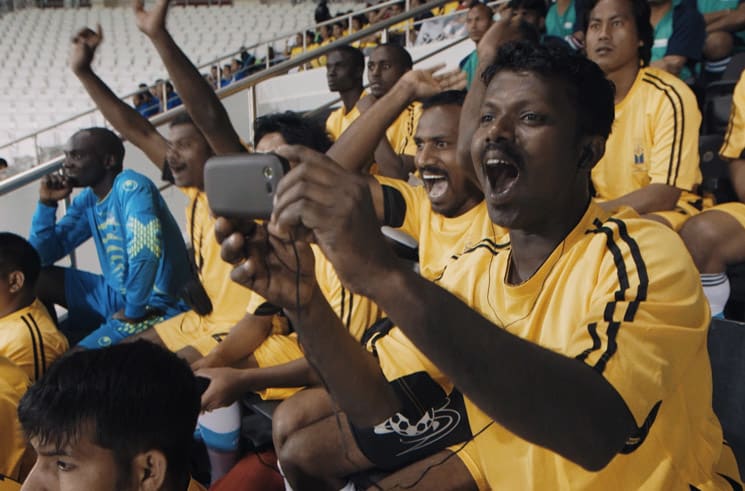The migrant workers building the facilities for the 2022 World Cup in Qatar have come from impoverished nations like Kenya, Ghana, India and Nepal in search of a better life for their families back home. But the expensive buildings they glimpse in the distance every day prove to be an elusive façade as they are faced with poor working conditions and low wages in what amounts to little more than slave labour. In the engrossing documentary The Workers Cup, escape comes in the form of a soccer tournament that pits the many companies involved in the massive construction project against one another.
The film quickly and introduces us to a large group of employees at the Gulf Contracting Company and slowly indoctrinates us into their way of life at the company. Desperate for work, they have been lured to Qatar with empty promises and forced to sign contracts that ensure long hours with little rest.
The Workers Cup is therefore a welcome distraction from their tiring and dreary day-to-day lives. They train for the sporting event in their free time, often dividing the entire day between work and practice in the process. The film devotes ample time to documenting their participation in the tournament, where they play as if their lives depended on whether they win or lose. It would seem frivolous to focus so much on their soccer games rather than the inhospitable working conditions if the thrill of the competition and camaraderie of their teamwork weren't so palpable.
The tournament doesn't start well for GCC, however, as a blowout loss in their first game challenges their resolve and has them quickly trying to regroup to avoid an early exit. Buoyed by a legion of ardent supporters (and the addition of a very talented goalkeeper), the team begins to find their footing and tenacity on the pitch. There's a heated moment before one of their games when GCC accuses the opposing team of foul play. To further illustrate just how seriously these guys take the competition, a player steps forward after a game to ask a company executive if they can have the whole week off to practice.
The film attempts to strike a tricky balance between sports documentary and exposé on the plight of these migrant workers and their harsh working conditions. While we can't help but become invested in the team's journey, we're left wanting to learn a little more about these disparate individuals and how they came together to work for the company. At one point, for instance, we meet a man who has been stabbed by a co-worker who only attacked him because he wanted to be declared mentally unfit to work for the company so he could then be sent home to his family. It makes you think the film is only scratching the surface of the hardships these workers endure.
But when the team comes together in their meetings and practices, sharing laughs with each other and openly airing their grievances, it becomes clear that even though they may have the GCC logo on their uniforms, they aren't really playing for the company. They're playing for each other and for their own sanity.
The film quickly and introduces us to a large group of employees at the Gulf Contracting Company and slowly indoctrinates us into their way of life at the company. Desperate for work, they have been lured to Qatar with empty promises and forced to sign contracts that ensure long hours with little rest.
The Workers Cup is therefore a welcome distraction from their tiring and dreary day-to-day lives. They train for the sporting event in their free time, often dividing the entire day between work and practice in the process. The film devotes ample time to documenting their participation in the tournament, where they play as if their lives depended on whether they win or lose. It would seem frivolous to focus so much on their soccer games rather than the inhospitable working conditions if the thrill of the competition and camaraderie of their teamwork weren't so palpable.
The tournament doesn't start well for GCC, however, as a blowout loss in their first game challenges their resolve and has them quickly trying to regroup to avoid an early exit. Buoyed by a legion of ardent supporters (and the addition of a very talented goalkeeper), the team begins to find their footing and tenacity on the pitch. There's a heated moment before one of their games when GCC accuses the opposing team of foul play. To further illustrate just how seriously these guys take the competition, a player steps forward after a game to ask a company executive if they can have the whole week off to practice.
The film attempts to strike a tricky balance between sports documentary and exposé on the plight of these migrant workers and their harsh working conditions. While we can't help but become invested in the team's journey, we're left wanting to learn a little more about these disparate individuals and how they came together to work for the company. At one point, for instance, we meet a man who has been stabbed by a co-worker who only attacked him because he wanted to be declared mentally unfit to work for the company so he could then be sent home to his family. It makes you think the film is only scratching the surface of the hardships these workers endure.
But when the team comes together in their meetings and practices, sharing laughs with each other and openly airing their grievances, it becomes clear that even though they may have the GCC logo on their uniforms, they aren't really playing for the company. They're playing for each other and for their own sanity.
